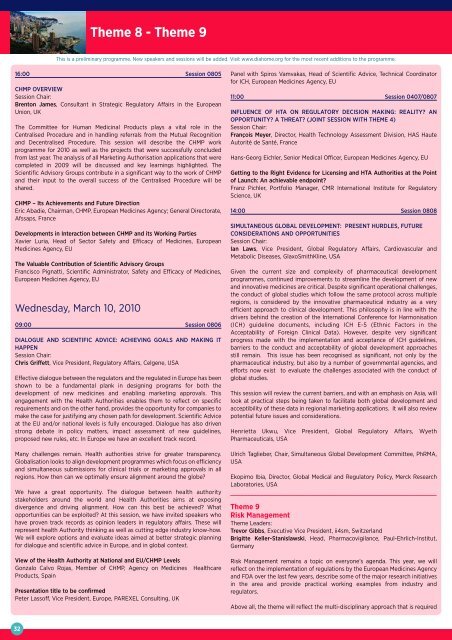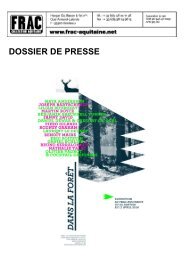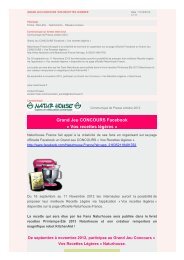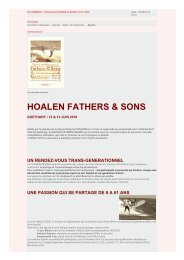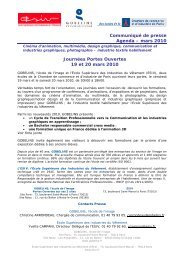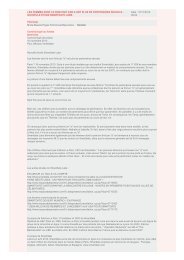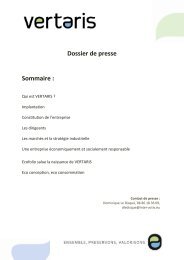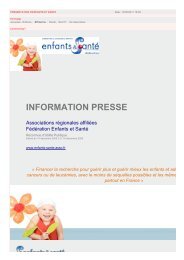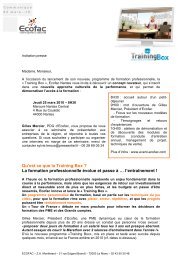Pre-Conference Tutorials, Monday, March 8, 2010, 09:00
Pre-Conference Tutorials, Monday, March 8, 2010, 09:00
Pre-Conference Tutorials, Monday, March 8, 2010, 09:00
Create successful ePaper yourself
Turn your PDF publications into a flip-book with our unique Google optimized e-Paper software.
32<br />
This is a preliminary programme. New speakers and sessions will be added. Visit www.diahome.org for the most recent additions to the programme.<br />
16:<strong>00</strong> Session 0805<br />
CHMP OVERVIEW<br />
Session Chair:<br />
Brenton James, Consultant in Strategic Regulatory Affairs in the European<br />
Union, UK<br />
The Committee for Human Medicinal Products plays a vital role in the<br />
Centralised Procedure and in handling referrals from the Mutual Recognition<br />
and Decentralised Procedure. This session will describe the CHMP work<br />
programme for <strong>2010</strong> as well as the projects that were successfully concluded<br />
from last year. The analysis of all Marketing Authorisation applications that were<br />
completed in 20<strong>09</strong> will be discussed and key learnings highlighted. The<br />
Scientific Advisory Groups contribute in a significant way to the work of CHMP<br />
and their input to the overall success of the Centralised Procedure will be<br />
shared.<br />
CHMP – Its Achievements and Future Direction<br />
Eric Abadie, Chairman, CHMP, European Medicines Agency; General Directorate,<br />
Afssaps, France<br />
Developments in Interaction between CHMP and its Working Parties<br />
Xavier Luria, Head of Sector Safety and Efficacy of Medicines, European<br />
Medicines Agency, EU<br />
The Valuable Contribution of Scientific Advisory Groups<br />
Francisco Pignatti, Scientific Administrator, Safety and Efficacy of Medicines,<br />
European Medicines Agency, EU<br />
Wednesday, <strong>March</strong> 10, <strong>2010</strong><br />
Theme 8 - Theme 9<br />
<strong>09</strong>:<strong>00</strong> Session 0806<br />
DIALOGUE AND SCIENTIFIC ADVICE: ACHIEVING GOALS AND MAKING IT<br />
HAPPEN<br />
Session Chair:<br />
Chris Griffett, Vice <strong>Pre</strong>sident, Regulatory Affairs, Celgene, USA<br />
Effective dialogue between the regulators and the regulated in Europe has been<br />
shown to be a fundamental plank in designing programs for both the<br />
development of new medicines and enabling marketing approvals. This<br />
engagement with the Health Authorities enables them to reflect on specific<br />
requirements and on the other hand, provides the opportunity for companies to<br />
make the case for justifying any chosen path for development. Scientific Advice<br />
at the EU and/or national levels is fully encouraged. Dialogue has also driven<br />
strong debate in policy matters, impact assessment of new guidelines,<br />
proposed new rules, etc. In Europe we have an excellent track record.<br />
Many challenges remain. Health authorities strive for greater transparency.<br />
Globalisation looks to align development programmes which focus on efficiency<br />
and simultaneous submissions for clinical trials or marketing approvals in all<br />
regions. How then can we optimally ensure alignment around the globe?<br />
We have a great opportunity. The dialogue between health authority<br />
stakeholders around the world and Health Authorities aims at exposing<br />
divergence and driving alignment. How can this best be achieved? What<br />
opportunities can be exploited? At this session, we have invited speakers who<br />
have proven track records as opinion leaders in regulatory affairs. These will<br />
represent health Authority thinking as well as cutting edge industry know-how.<br />
We will explore options and evaluate ideas aimed at better strategic planning<br />
for dialogue and scientific advice in Europe, and in global context.<br />
View of the Health Authority at National and EU/CHMP Levels<br />
Gonzalo Calvo Rojas, Member of CHMP, Agency on Medicines Healthcare<br />
Products, Spain<br />
<strong>Pre</strong>sentation title to be confirmed<br />
Peter Lassoff, Vice <strong>Pre</strong>sident, Europe, PAREXEL Consulting, UK<br />
Panel with Spiros Vamvakas, Head of Scientific Advice, Technical Coordinator<br />
for ICH, European Medicines Agency, EU<br />
11:<strong>00</strong> Session 0407/0807<br />
INFLUENCE OF HTA ON REGULATORY DECISION MAKING: REALITY? AN<br />
OPPORTUNITY? A THREAT? (JOINT SESSION WITH THEME 4)<br />
Session Chair:<br />
François Meyer, Director, Health Technology Assessment Division, HAS Haute<br />
Autorité de Santé, France<br />
Hans-Georg Eichler, Senior Medical Officer, European Medicines Agency, EU<br />
Getting to the Right Evidence for Licensing and HTA Authorities at the Point<br />
of Launch: An achievable endpoint?<br />
Franz Pichler, Portfolio Manager, CMR International Institute for Regulatory<br />
Science, UK<br />
14:<strong>00</strong> Session 0808<br />
SIMULTANEOUS GLOBAL DEVELOPMENT: PRESENT HURDLES, FUTURE<br />
CONSIDERATIONS AND OPPORTUNITIES<br />
Session Chair:<br />
Ian Laws, Vice <strong>Pre</strong>sident, Global Regulatory Affairs, Cardiovascular and<br />
Metabolic Diseases, GlaxoSmithKline, USA<br />
Given the current size and complexity of pharmaceutical development<br />
programmes, continued improvements to streamline the development of new<br />
and innovative medicines are critical. Despite significant operational challenges,<br />
the conduct of global studies which follow the same protocol across multiple<br />
regions, is considered by the innovative pharmaceutical industry as a very<br />
efficient approach to clinical development. This philosophy is in line with the<br />
drivers behind the creation of the International <strong>Conference</strong> for Harmonisation<br />
(ICH) guideline documents, including ICH E-5 (Ethnic Factors in the<br />
Acceptability of Foreign Clinical Data). However, despite very significant<br />
progress made with the implementation and acceptance of ICH guidelines,<br />
barriers to the conduct and acceptability of global development approaches<br />
still remain. This issue has been recognised as significant, not only by the<br />
pharmaceutical industry, but also by a number of governmental agencies, and<br />
efforts now exist to evaluate the challenges associated with the conduct of<br />
global studies.<br />
This session will review the current barriers, and with an emphasis on Asia, will<br />
look at practical steps being taken to facilitate both global development and<br />
acceptibility of these data in regional marketing applications. It will also review<br />
potential future issues and considerations.<br />
Henrietta Ukwu, Vice <strong>Pre</strong>sident, Global Regulatory Affairs, Wyeth<br />
Pharmaceuticals, USA<br />
Ulrich Taglieber, Chair, Simultaneous Global Development Committee, PhRMA,<br />
USA<br />
Ekopimo Ibia, Director, Global Medical and Regulatory Policy, Merck Research<br />
Laboratories, USA<br />
Theme 9<br />
Risk Management<br />
Theme Leaders:<br />
Trevor Gibbs, Executive Vice <strong>Pre</strong>sident, ii4sm, Switzerland<br />
Brigitte Keller-Stanislawski, Head, Pharmacovigilance, Paul-Ehrlich-Institut,<br />
Germany<br />
Risk Management remains a topic on everyone’s agenda. This year, we will<br />
reflect on the implementation of regulations by the European Medicines Agency<br />
and FDA over the last few years, describe some of the major research initiatives<br />
in the area and provide practical working examples from industry and<br />
regulators.<br />
Above all, the theme will reflect the multi-disciplinary approach that is required


